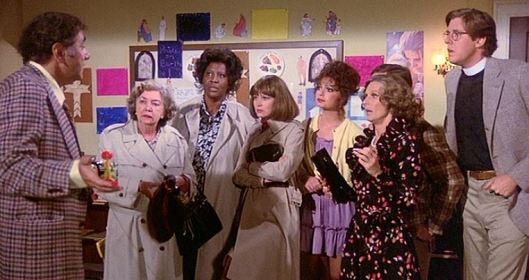While today’s movie is based on a true story, I cannot say how closely. I started to read the book, which I found at a library book sale many years ago, but its writing was both dry and missionary, so I never finished it. What’s more while Wikipedia has an admittedly brief page on the movie, it has nothing at all about either the original book or the real-life figure who wrote it about his own experiences. So I cannot speak to the accuracy and can only speak to other issues.
At any rate, the movie begins with Reverend Michael Hill (Edward Hermann) and his two children, Dean (Bobby Rolofson) and Carmel (Melora Hardin), moving to your standard Small Fictional California City, where Mike is to take over the eponymous North Avenue Presbyterian Church. In an attempt to encourage various church members to take a more active role in the church, he hands the church’s “sinking fund” over to Mrs. Rose Rafferty (Patsy Kelly), telling her that he would like her to come up with ways to increase the fund. Unfortunately, her husband Delaney (Douglas Fowley) has the idea to bet the whole wad on a horse called Sunday Treat in an illegal betting parlour. Which, um, doesn’t work, because Sunday Treat loses. Bookie Harry the Hat (Alan Hale, Jr., not wearing his Skipper hat) won’t give the money back, and Reverend Hill kind of loses it on a local TV channel’s late-night prayer service.
What ends up happening is that two men from the Treasury Department, Marv (Michael Constantine) and Tom (Steve Franken) come to North Avenue to enlist Mike, and as many of the local men as they can get together, to break the local organized crime racket. But none of the men are interested, and instead, some of the women agree to help. Rose, for one. Also harrassed mother Vickie (Barbara Harris), chipper bride-to-be Jane (Karen Valentine), single and flighty Claire (Cloris Leachman), tough and intelligent Cleo (Virginia Capers), and eventually no-nonsense Anne (Susan Clark). After a few bad starts, they decide to join together to find the mob bank.
It’s a weirdly packed cast—for another, late in the movie, we have Ruth Buzzi. Bobby Rolofson died young, but I’m willing to bet some of you actually reacted to the name Melora Hardin. If you didn’t, she’s recently been on Transparent and has previously been on everything from The Office to Quantum Leap, plus thirty-six movies. Almost every person whose biography I checked had done a number of things I’d heard of, some of which I remembered. And not just Disney, either; Patsy Kelly was in Rosemary’s Baby, remember!
It also isn’t just that there are so many women, all of whom are different in personality. It’s that, okay, Claire is a flake who’s clearly angling to be the second Mrs. Reverend Michael Hill. But Cleo? You can trust Cleo. More than Delaney Rafferty. Jane would be fine if she weren’t marrying that drip Howard (Dick Fuchs). Anne is hurt, because her father was basically forced to retire from the job Mike comes in to take, and the film assures us that it’s okay, provided she doesn’t take her anger out on Mike, who after all just took the job that was offered to him.
Vickie is a special case—she has several children; I’m not sure we ever get an accurate count on how many. And all of them have activities. So she’s trying to fight crime between dealing with her kids, and the Treasury Department doesn’t provide child care. Or, it looks like, pay of any kind, with which she might hire a babysitter or something. She’s the sort of casually neglectful mother you tended to get in the ’70s, who mostly lets her kids go and do what they want, though she’s also enough involved in their lives to drive them to games and pet shows and who knows what else.
And, after all, none of the men have any interest in helping. Mike asks more than a few, and they all turn him down. The women are all he has, and the women are not only willing but eager, as they can see the destruction organized crime is wreaking on their nice little community. They’ll do what it takes, even if what it takes is something they aren’t expected to be able to do.
I do wonder about the fact that the Treasury Department is relying on citizens instead of sending in agents; that seems weird. One supposes it must be true, because “based on a true story,” but is it really better to have locals risking their lives the way the women do in a few places? There’s got to be a better way. It’s a fun movie, and again “true story,” but that part has always seemed a little weird to me.
Still, when I think of several of the people in this movie, this is the first place I think of them. I honestly think this is a pretty good movie. Certainly it’s a sight more feminist than The Million Dollar Duck.


